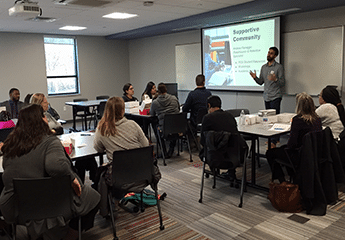Is a fear of failure holding you back from success?
If we’re honest, most of us are terrified of failing, whether at our jobs, in school or in social circles. We see failure as an undesirable experience that should be avoided at all costs. We also assume that when we fail at an activity, it means that we have failed as people.
But, we could choose to look at failure as a valuable learning experience. We should be looking for important lessons when we fail. Failure only stops us if we let it. In fact, it can be a catalyst for significant growth.
Some of the most successful people in the world have experienced significant failures:
- Michael Jordan, widely considered to be one of the greatest basketball players of all time, was cut from his high school basketball team because his coach didn’t think he had enough skill.
- Warren Buffet, one of the richest and most successful businessmen ever, was rejected by Harvard.
- Richard Branson, owner of the Virgin empire, dropped out of high school.
How would our world look today if these “failures” had given up? What failures do we allow to stop our futures? And is it really failure that we fear?
If we want to succeed, we need to learn to reframe failure.
IS IT REALLY FAILURE THAT WE FEAR?
Many would argue that it is not failure we fear. Rather, we fear the imagined negative consequences that follow the failure. This fear leads to having low self-esteem, avoiding challenging tasks and feeling pessimistic.
There are five main fears that people have when it comes to failure:
- Experiencing shame and embarrassment.
- Being forced to negatively readjust how they see themselves.
- Having an uncertain future.
- Upsetting important others.
- Having important others lose interest.
Normally, fear is a self-protection mechanism. It leads you to avoid potentially negative situations. However, fear of failure will stop you from trying, create self-doubt, stall your progress and could lead you to go against your values.
Of course, this raises the question: where does the fear of failure originate?
There are a number of possibilities:
- Patterns from childhood—Hyper-critical adults can cause children to internalize damaging mindsets.
- Perfectionism—The desire to be seen as perfect can cause us to fear anything that would potentially damage our image.
- Over-personalization—The ego may lead us to over-identify with failures.
- Past events—Fear of failure is often related to embarrassing or traumatic events in the past.
- Unhealthy relationships—Negative thoughts and negative self-talk stemming from overly strict parents, demeaning friends or judgmental authority figures can lead to this debilitating fear.
People with a fear of failure often give up unless they are guaranteed success in certain tasks.
These are just some of the reasons people suffer from fear of failure. Most of the time, people can defeat this fear with some tools and skills provided by life coaches or counselors. But for some, this fear becomes an extreme problem.
WORKING IN AN ENVIRONMENT OF FEAR
The environment of an organization and the perceived pressure to succeed can lead to fear of failure.
It is unfortunate that so many organizations today have a culture of perfection: a set of beliefs that failure is unacceptable. This almost inevitably leads to inordinate amounts of stress and terror in an organization. It also commonly leads to cover-ups, finger-pointing and shifting of blame.
Some people in an organization are so tied to their past successes that they are unwilling to stretch themselves again to take another risk. They simply rest on their past success and never move forward.
Working in such an environment can amplify existing fears of failures. You can become so terrified of failing that you shrink from challenges. When you don’t put yourself out there, you are losing the opportunity to demonstrate your creativity and put your strengths on display.
When the fear of failure overwhelms you, and you can’t accept the possibility of making mistakes, you simply will not be able to make progress in your career.
When you need to make an important decision, fear of choosing wrong can lead to delays or no decision at all. Fear of failure can also lead to shrinking back from possible opportunities that can improve your career.
If you find yourself working in an environment where fear is the dominant theme, you need to develop specific skills to succeed.
RECOGNIZING AND TREATING FEAR OF FAILURE
In its extreme form, fear of failure is termed as atychiphobia. Individuals coping with atychiphobia can experience crippling self-doubt and extreme fear of failure due to the perceived ridicule one might face after a failure.
Atychiphobia can severely affect the quality of life for the sufferer. They may go out of their way to avoid taking a risk on even the smallest level.
If you recognize the irrational failure of fear in yourself or someone else, then it is time to regain control over life. There are specific signs of atychiphobia to look for:
- Extreme mental anxiety.
- Digestive issues.
- Headache.
- Muscle tension.
- Panic (e.g., rapid breathing, dry mouth, sweating, nausea).
You’ll be able to see these symptoms when you or someone you know are asked to do a task or do something you think you won’t be perfect at. You’ll become so overwhelmed with fear that you appear to “break down.” If this phobia remains untreated, symptoms could continue to get worse.
Thankfully, there are ways to treat this condition:
- Talk therapy with a counselor helps you open up about your fears and come up with effective solutions to cope with the stress brought on by fear of failure.
- Medication can help reduce symptoms of anxiety which will allow you to perform the task you previously couldn’t.
- Self-motivation instruction can help train you, when experts teach you how to break a task into smaller, manageable pieces and working slower.
TOOLS FOR OVERCOMING YOUR FEARS
Once you’ve treated the most extreme symptoms of fear of failure, you can begin to harness your fear and leverage it for success.
Embracing our fear is not only a sign of courage; it is also an opportunity for us to reach beyond the fear and harness that energy for success.
Many experts recommend visualization as way of overcoming the negative thoughts so often associated with failure. Instead of letting negative self-talk keep you from taking risks, imagine how great life will be after you’ve succeeded. By visualizing yourself as a success, you diffuse your fear of failure.
Also, consider breaking down large, fear-inducing goals into smaller, less intimidating ones. When you reach each small goal, recognize that these are early successes in the grand scheme of the overall project.
Another thing to consider, which may sound counterintuitive, is to be open to taking risks. Honestly ask yourself: what’s the worst that could happen? Even your worst fears probably aren’t that terrible when you actually confront them.
Perhaps most importantly, accept that failure is inevitable. At some point along the way, you will fail. But here’s the critical point: failure is not something to fear. Rather, it is something to learn and grow from.
When we embrace our failures, we learn from them. That knowledge is the key to succeeding further down the line. So, really, the more we fail, the more we will succeed. Freeing up our minds by releasing the fear gives us license to be creative and bold.
Once you have freed yourself from fear, you can change your perspective. You will be more able to recognize obstacles and take them on with a more successful attitude. This will allow you to grow.
As Eleanor Roosevelt said: “We gain strength and courage and confidence by each experience in which we really stop to look fear in the face … we must do that which we think we cannot.” Facing our fear takes away the influence it has on our minds.
EXCEL IN YOUR GOALS
You have the potential to go further in your personal and professional goals. Discover an educational pathway forward that can boost your confidence as you become who you know you’re meant to be. Learn more about our programs designed for busy adults like you.











